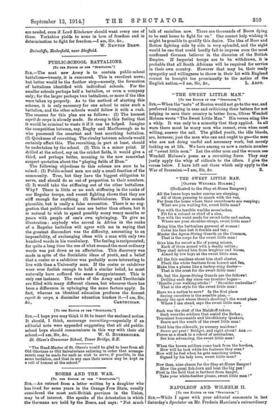PUBLIC-SCHOOL BATTALIONS.
[To THE EDITOR Or VIZ "SrscrIroa."] Sts,—The next new Army is to contain public-school battalions—twenty, it is rumoured. This is excellent news; but better would be the further step—namely, the formation of battalions identified with individual schools. For the smaller schools perhaps half a battalion, or even a company only; for the larger perhaps two battalions, or more if the idea were taken up properly. As to the method of starting this scheme, it is only necessary for one school to raise such a battalion, and the other schools would follow it with a rush. The reasons for this plan are as follows : (1) The keenest esprit de corps is already made. So strong is this feeling that it would be criminal to waste it if it can be helped. Imagine the competition between, say, Rugby and Marlborough as to who possessed the smartest and best marching battalion. (2) Quickness of recruiting. The rivalry between schools would certainly affect this. The recruiting, in part at least, should be undertaken by the school. (3) This is a minor point. If drilled at the school, say on the cricket fields, it would give a third, and perhaps better, meaning to the now somewhat suspect quotation about the " playing fields of Eton."
The following objections to this scheme are sure to be raised : (1) Public-school men are only a small fraction of the community. True, but they have the biggest obligation to serve, and should do so out of proportion to their numbers. (2) It would take the stiffening out of the other battalions. Why ? There is little or no such stiffening in the ranks of our Regular troops, and recent fighting shows that they are stiff enough for anything. (3) Snobbishness. This sounds plausible, but is really a false accusation. There is no sug- gestion that public-school men are better than others, but it is natural to wish to spend possibly many weary months or years with people of one's own upbringing. To give an illustration : anybody who served in Africa in the ranks of a Regular battalion will agree with me in saying that the greatest discomfort was the difficulty, amounting to an impossibility, of exchanging ideas with a man with only two hundred words in his vocabulary. The feeling is reciprocated; for quite a long time the use of what seemed the most ordinary words was put down as an affectation. This discovery was made in spite of the Socialistic ideas of youth, and a belief that a coster or a cabdriver was probably more interesting to live with than a University man. If the coster or cabdriver were ever foolish enough to hold a similar belief, he must naturally have suffered the same disappointment. This is only one instance. The ranks of the Army and Territorials are filled with many different classes, but wherever there has been a difference in upbringing the same factors apply. In fact, whereas an identical education produces the fiercest esprit de corps, a dissimilar education hinders it.—I am, Sir,


































 Previous page
Previous page